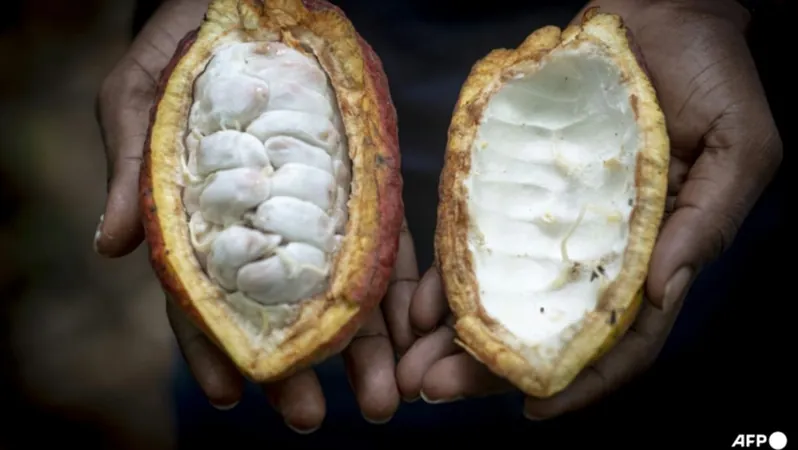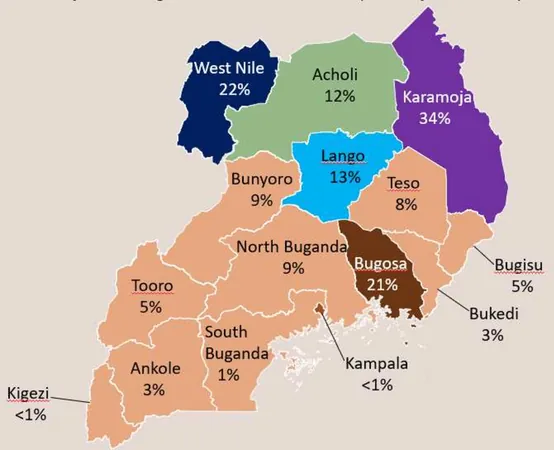
Cocoa Prices Surge: Farmers Worry as Chocolate Lovers Face the Consequences!
2024-10-30
Author: Daniel
With the start of the new cocoa season in Ghana, farmers find themselves deeply concerned about the upcoming harvest.
As the world's second-largest cocoa producer, trailing only Ivory Coast, Ghana’s cocoa output is vital to global supply—together, these nations account for over 60% of the world's cocoa.
However, the previous cocoa season ended on a worrying note, with Ghana producing less than 430,000 tonnes—just half of its typical yield. Cocoa farmer Stephen Osei Appiah voiced the fears shared by many when he stated, "This year, the rainfall pattern has been very poor. We barely had enough rain, so we may not get a good yield this time."
The Growing Crisis: What’s Happening?
Ghana's cocoa farmers have faced ongoing challenges over the past three years. Climate change is causing unpredictable weather patterns, leading to prolonged dry spells and a cycle of flooding that devastates cocoa farms.
The repercussions extend beyond just weather; factors like pest infestations, plant diseases, and illegal mining further threaten crop yields.
This precarious situation has resulted in soaring cocoa prices, heavily impacting local merchants. Cocoa trader Opanyin Kwarteng lamented, "I used to buy more than 500 bags of beans every season, but now, I barely get 200 bags from farmers due to the poor harvest."
Cocoa Market: Price Spike and Future Implications
The global cocoa market is feeling the strain as well. Due to the ongoing shortages, cocoa prices experienced a meteoric rise, tripling between January and April 2023, reaching prices above $12,500 per tonne.
While prices have slightly eased, they still remain over 60% higher than the beginning of the year.
In response to the crisis, Ghana Cocoa Board is making adjustments, revising its cocoa production target down by nearly 20% to 650,000 tonnes.
Fiifi Boafo, the board’s public affairs manager, expressed optimism that price increases would help sustain the industry, despite the newly introduced market challenges.
Chocolate Lovers Brace for Impact: Are Treats Getting Too Expensive?
As the festive season approaches, chocolate lovers in the UK—who depend overwhelmingly on cocoa imports from West Africa—are feeling the impact of rising prices.
Major retailers have raised prices for popular holiday treats by as much as 10% over the past year.
Tom Hughes, co-founder of the UK-based chocolate company Ruby Hue, shared the anxiety many manufacturers face. "It keeps you up at night when you suddenly find it hard to secure cocoa supply as prices keep shifting," he explained.
This pressure reverberated at the recent London Chocolate Forum, where industry players noted that while consumer demand remains steady, persistent high cocoa prices could lead to long-term issues.
Marc Donaldson, founder of consultancy Cacao2Chocolate, cautioned about a potential “demand destruction,” wherein consumers might reduce chocolate purchases due to sustained high prices.
The Continuing Love Affair with Chocolate
Historically, the UK ranks among the top 10 chocolate-consuming nations. However, as cocoa prices rise steeply, consumers are beginning to notice changes in their beloved treats.
For example, the Cadbury Dairy Milk bar, a classic favorite, has shrunk in size but doubled in price since 2010, now nearing £2 ($2.50).
Innovative companies are seeking alternatives to adapt. British firm Nukoko is exploring the use of domestic fava beans in place of cocoa, claiming environmental benefits and capturing the interest of consumers looking for new chocolate experiences.
As the cocoa crisis unfolds, the future of chocolate remains uncertain. Will consumers adjust to higher prices, or is a love for chocolate enough to withstand these economic pressures? Only time will tell, but for now, the bitter taste of skyrocketing cocoa prices is felt deeply by farmers and chocolate lovers alike.





 Brasil (PT)
Brasil (PT)
 Canada (EN)
Canada (EN)
 Chile (ES)
Chile (ES)
 España (ES)
España (ES)
 France (FR)
France (FR)
 Hong Kong (EN)
Hong Kong (EN)
 Italia (IT)
Italia (IT)
 日本 (JA)
日本 (JA)
 Magyarország (HU)
Magyarország (HU)
 Norge (NO)
Norge (NO)
 Polska (PL)
Polska (PL)
 Schweiz (DE)
Schweiz (DE)
 Singapore (EN)
Singapore (EN)
 Sverige (SV)
Sverige (SV)
 Suomi (FI)
Suomi (FI)
 Türkiye (TR)
Türkiye (TR)